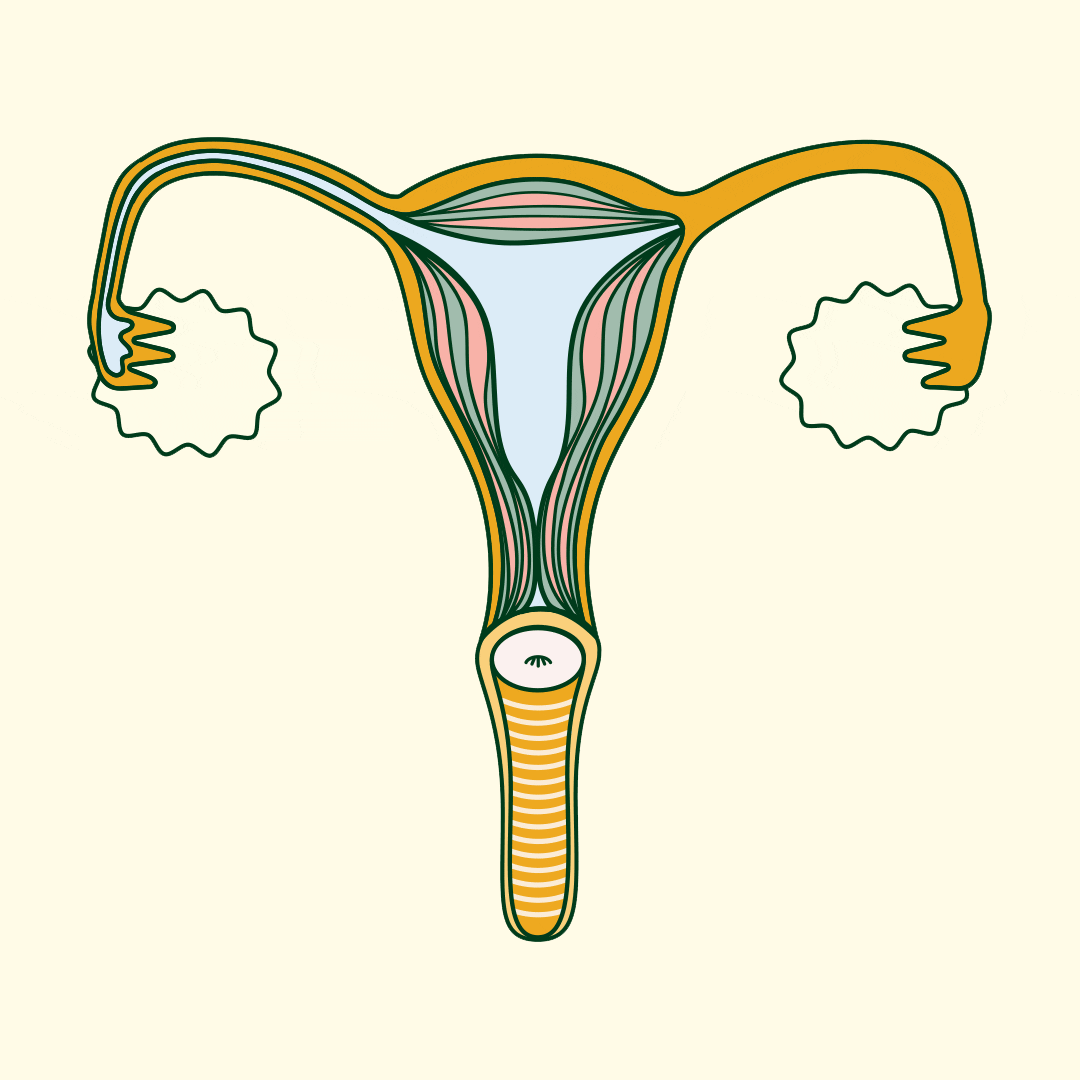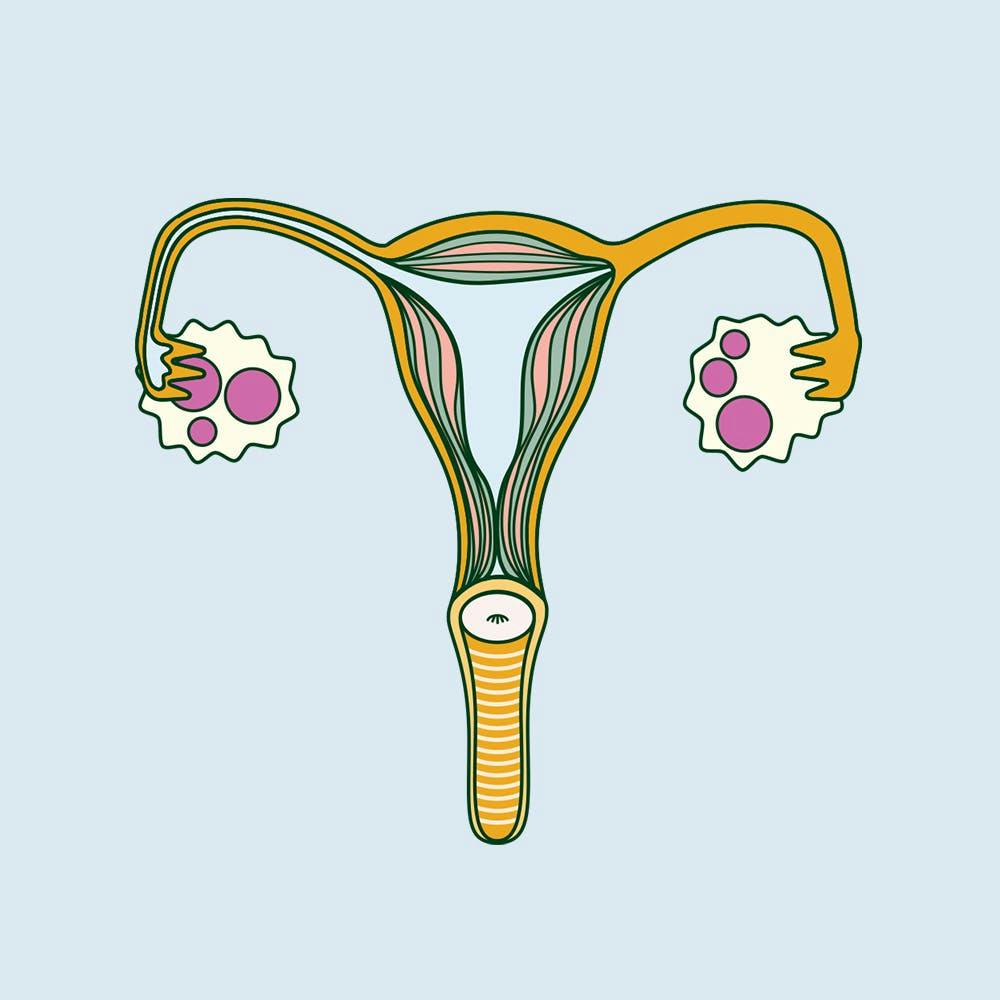Table of contents
1. Despite what rigid, arbitrary societal standards may have led you to believe, body hair and facial hair are completely normal, regardless of your biological sex or gender. Facial and body hair are even more common in people with polycystic ovary syndrome (PCOS), which can cause both unusual hair growth and hair loss.
2. What is PCOS?
3. How to treat PCOS
Illustrated by Sabrina Bezerra
Despite what rigid, arbitrary societal standards may have led you to believe, body hair and facial hair are completely normal, regardless of your biological sex or gender. Facial and body hair are even more common in people with polycystic ovary syndrome (PCOS), which can cause both unusual hair growth and hair loss.
PCOS can cause a variety of different symptoms, including hirsutism and noticeable hair loss or thinning or the hair.
Depending on its severity, PCOS-related hair growth and hair loss can often be one of the more emotionally troubling symptoms.
Whether you’re noticing thicker, darker chin hairs or a thinning hairline, understanding how PCOS can affect your hair (and what you can do about it) can be helpful.
What is PCOS?

Polycystic ovary syndrome (PCOS) is a group of symptoms that affects the normal function of ovaries and ovulation. Around one in 10 women in the UK have PCOS, making it one of the most common gynae conditions.
PCOS presents itself through three main features: irregular periods, a higher level of androgens (hyperandrogenism), and polycystic ovaries.
You need to have at least two of these symptoms to be diagnosed with PCOS, and not everyone with PCOS will have all three. Despite the confusing name, polycystic ovaries are not always a requirement for a PCOS diagnosis.
PCOS symptoms
Aside from changes in body and facial hair, common symptoms of PCOS are:
- irregular periods or no periods at all (amenorrhea)
- difficulty getting pregnant
- weight gain
- acne
What causes PCOS?
The precise cause of PCOS is still unknown (go figure), but the main theory is that PCOS is caused by a hormone imbalance.
Many women with PCOS have a hormonal imbalance, including
- Higher levels of androgens like testosterone (hyperandrogenism)
- Higher levels of luteinising hormone (LH), a hormone that stimulates ovulation
- Lower levels of sex hormone-binding globulin (SHBG), a protein in blood that binds testosterone to lessen its effect
- In some cases, higher levels of prolactin, a hormone that stimulates the production of breast milk in pregnancy.
It’s unclear why these hormonal imbalances are present in the first place, but experts believe it could be due to a problem in the glands that produce these hormones (like the ovaries), or due to insulin resistance.
Higher levels of insulin can cause the ovaries to produce more testosterone, which interferes with follicle development and stops normal ovulation, along with a range of other PCOS symptoms.
PCOS and hirsutism
PCOS can cause hirsutism, which is a medical term for excessive hairiness, particularly in male-typical areas like the face, chest, and back. This hair is usually darker and coarse than body or facial hair that cis women and AFAB folks typically have.
Hirsutism is a very common symptom of PCOS. In fact, around 70% of people with hirsutism are diagnosed with PCOS (but that alone is not enough to diagnose the disorder).
Hirsutism is caused by many different factors, but in PCOS it’s usually the result of raised levels of androgens (aka “male” sex hormones) like testosterone. Everyone has naturally occurring androgens – no matter their biological sex – but cis women and AFAB people have lower levels of them compared to cis men.
Testosterone plays a key role in hair growth and appearance. Ever wondered why you start growing darker, fuller body hair during puberty? Yep, that’s thanks to testosterone.
While there’s nothing wrong with excess facial or body hair, it’s understandable if hirsutism causes you distress.
Does PCOS cause hair loss?
While many with PCOS grow thicker hair on their face and body, some experience hair thinning and hair loss, which is referred to as female pattern hair loss. Yep, it’s a double whammy of more hair in unwanted places, but less hair on your head.
Similarly to the baldness that affects cis men, hair loss cause by PCOS is the result of excessive levels of certain androgen hormones.
Your body produces a hormone called dihydrotestosterone (DHT) as a byproduct of testosterone. DHT can bind to hair follicles and cause something called ‘miniaturisation’, a process that reduces hair to shrink in size and therefore thin out and even stop growing altogether. In women, this is referred to as female pattern hair loss, or androgenic alopecia. The telltale signs of female pattern hair loss are:
- Visible thinning around your part line and hairline
- Diffuse thinning of hair that spreads from the top of your scalp
The good news is that it’s uncommon for female pattern hair loss to cause complete baldness, unlike in cis men.
How to treat PCOS
Any hair that you lose due to PCOS won’t grow back on its own, but you may be able to stimulate new hair growth with adequate treatment. PCOS-related hair loss can be treated by firstly targeting the underlying cause, aka. PCOS.
Although there’s no cure for polycystic ovary syndrome, several medications are available that can treat and manage PCOS symptoms, including hair loss and hirsutism.
- Hormonal contraception is often used to treat and manage PCOS symptoms, including the combined pill, patch, vaginal ring, injection and IUS.
- Anti-androgen medications. Medications that lower your production of androgens or block their effects may help to treat and prevent hair loss, acne, facial/body hair growth and other PCOS symptoms.
- Metformin is a diabetes medication that is often prescribed as an off-label to treatment for PCOS in women with insulin resistance. It lowers insulin resistance and can help with symptoms like facial/body hair, weight gain and irregular periods.
- Your GP may recommend lifestyle changes to manage PCOS symptoms. If you’re overweight, weight loss and weight management are often the first course of treatment in PCOS (*big sigh*). This is because weight loss of even just 5% helps to lower your levels of androgens and insulin. Equally, maintaining a healthy and balanced diet and regular exercise are key.
It’s understandable if hair growth or hair loss caused by PCOS is a difficult symptom to live with. Just remember that whether or not you have PCOS, body and facial hair are completely normal!






